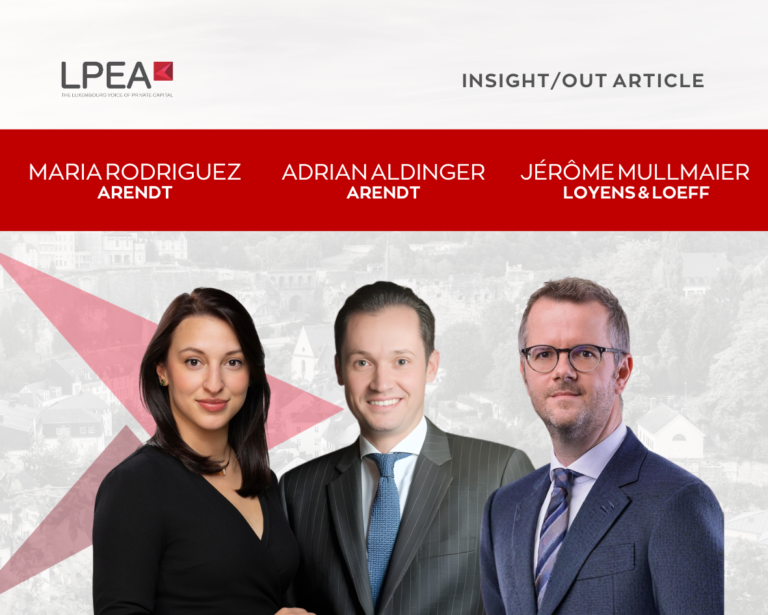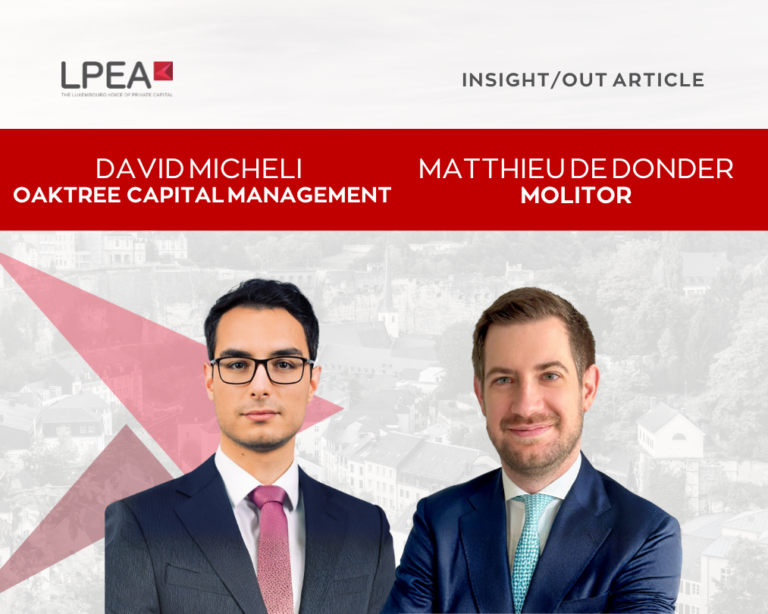Recently elected Chair of Invest Europe, Anne Fossemalle says fostering transparency, governance, and alignment of interests for General and Limited Partners is critical to attract investment.
As featured in LPEA Insight/Out magazine #19, September 2021.
Congratulations for your recent election as Invest Europe Chair for 2021-2022. What are your priorities for this mandate?
I’m deeply honoured to have been elected to the position of chair of Invest Europe – the association representing Europe’s private equity, venture capital and infrastructure sectors, as well as their investors. Its’ exciting to participate in the representation of the membership of the association for the year to come, and to work with the strong, talented, and committed team at Invest Europe.
My priorities reinforce those of the association itself and are focused on: enhancing and expanding the membership; expanding on Invest Europe’s tangible benefits for its membership and support for the wider Private Equity sector and support members to increase their diversity and accelerate their sustainability-related activities.
Given a key Invest Europe strength is its broad membership of GPs and institutional investors, i.e. EBRD, my first ‘step’ as Chair will be to meet as many of them as possible. My intent is to be a good conduit and understand how the association can provide even better support for its membership.
Next is sharing the excellent work done by Invest Europe and its previous chair, Thierry Baudon, in clearly outlining that Private Equity is a genuine force for good – both economically and socially
It is a fact that Private Equity creates jobs. The recent excellent publication by Invest Europe – Private Equity at Work, not only reveals that just over 10 million Europeans work in PE-backed companies, but that PE job creation was 6 times the European average in 2019! So, in 2019, PE created as many jobs as the entire working population of Tallinn!
“We engage with policymakers on a wide range of topics, from the scope of state aid measures to valuation rules.”
Given my work as LP for a Development Finance Institution (DFI), I feel I’m very well placed to underline PE’s social impact: PE helps pay pensions and it helps pay insurance premiums. Some 40% of capital raised by PE comes from pension funds and insurance companies! This is a ‘virtuous circle’, one in which PE has an important role in ‘Building Back Better’ post-COVID.
I’m also eager to continue to support Invest Europe’s agenda when it comes to increasing diversity in the industry and growing its sustainability participation and presence.
For example, Invest Europe in March of this year launched its climate change guide – developed for private equity investors and providing practical, entry-level, support to actors and stakeholders in the European market seeking to integrate climate change considerations in their investment processes.
It also includes practical tools and guidelines for identifying climate change-related risks and opportunities in private equity portfolio companies, complemented with practical business cases. And two more advanced versions of the member-only guide are planned in 2021.
Which values of the EBRD, where you are Director of Equity Funds, are you bringing to your role in Invest Europe?
I have worked in several capacities prior to heading EBRD’s Funds of Funds programme, notably leading EBRD’s debt and direct equity investments into financial institutions. I have over 25 years of private equity experience, holding numerous Supervisory Board and Investment Committee memberships with major fund managers within the EBRD’s countries of operations. EBRD’s goal is to invest and transform positively economies. Our aim is to demonstrate that these go hand in hand.
The EBRD is the largest investor in funds, particularly in Central and Eastern Europe and our aggregated numbers show that investing in funds in our regions provide healthy returns. Private Equity is a positive investment in this region. Moreover, beyond delivering good financial returns, we transform companies, we create jobs, moreover these returns also grow people’s pensions. This is the message I bring from the EBRD and into the role of Invest Europe Chair.
With my guidance, and under the leadership of Eric de Montgolfier, CEO of Invest Europe, we will continue to demonstrate how Private Equity is a force for good. It supports long-term investors seeking returns to pay pensions and insurance premiums while meeting ambitious social and environmental goals. It is a cornerstone of Europe’s economy and society.
Coming from the Limited Partners (LP) side and having been member of IE’s LP Platform Council and of ILPA’s Board for many years, what can be done to attract more investors to the asset class?
ILPA is a robust association that derives its strength from a broad but obviously differentiated membership. ILPA represents – globally and internationally – all institutional investors. The goals of ILPA and Invest Europe are similar: to be the voice of their membership; to defend their interests and participate in, and help inform, Public Affairs discussions and regulations affecting the sector.
Meanwhile, Invest Europe’s Limited Partners Platform is made up of professional investors that are typically part of large investment institutions, including pension funds, insurance companies, government agencies, charities, and family offices, and come from across the globe. These institutions, and their underlying participants such as pensioners and endowment holders, are the key beneficiaries of private equity’s outperformance and diversification.
I feel privileged to combine membership to both Boards for a year, and my goal will be to emphasise cooperation on numerous common topics.
You ask what can be done to attract more investors? Well fostering transparency, governance, and alignment of interests for General and Limited Partners is critical. ILPA Principles and Invest Europe Professional standards both contribute to shaping these principles.
A significant part of Invest Europe’s work relates to regulation. Which of the upcoming policy developments should be mostly closely followed by all IE’s constituency?
It is critical that we build Invest Europe’s position as the key interlocutor for the industry and the foremost relevant partner for policymakers, as we seek to achieve maximum impact for our advocacy efforts on behalf of the European PE industry.
We will continue to focus on ensuring policymakers are aware of the impact of the crisis on our industry, and so be able to take decisions that would make it easier for our members and their portfolio companies to continue operating. We engage with policymakers on a wide range of topics, from the scope of state aid measures to valuation rules. Meanwhile, we have provided our members with relevant and detailed information on the various COVID measures that were introduced in all Member States.
Thought leadership, direct advocacy and member guidance will remain the top three priorities for Invest Europe on the policy front.





